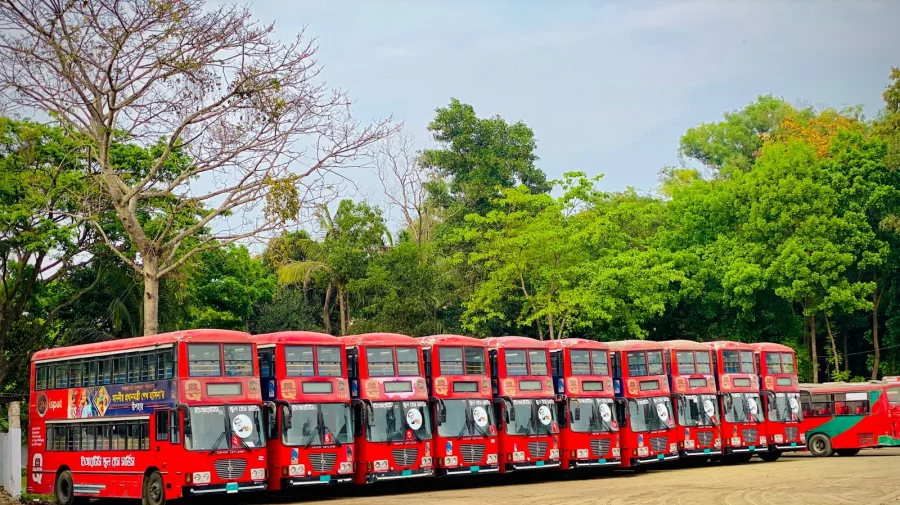Every positive action that looks to address a need of the general public, and where the public and private sector can partner together, will contribute to successfully building Smart Bangladesh
When there was unrest in 2018 in the country due to road safety issues, it became clear that transportation had to change. In Chattogram, where I am now the Deputy Commissioner (DC) and District Magistrate, there was a demand from the students to introduce some buses for their safe transportation.
Under the Chattogram District Administration which looked after operations and management, 10 BRTC school buses began catering to the needs of the students. What is more remarkable is that a public-private partnership has formed because the fuel cost was provided by a leading private company of the country.
This is a simple case of a need of the public being identified, and an efficient public-private partnership that helped bring about a solution.
If we want to create a smart Bangladesh, such public-private partnerships must become more common. The public sector and private sector must not operate in silos, trying to outdo the other.
When we learned that Bangladesh wants to become “Smart Bangladesh” and become a high-income country in less than 20 years, a new form of excitement coursed through us. It was not that long ago when we were still struggling as a country. Today, even though there are more challenges than ever, we have made so much progress as a nation and we have to feel proud about this.
If we are to become a smart Bangladesh, it needs to happen at every level. We cannot have Dhaka becoming even more prosperous, while the rest of the country lags behind. Digital Bangladesh tried to bring rural and urban people together, but in Smart Bangladesh, this has to be a full reality.
When the ICT Division introduced the Smart District Innovation Challenge, where Deputy Commissioners will have to submit innovative ideas to build smart districts as part of building a smart Bangladesh, where providers of most innovative ideas will win Tk 1 crore from a2i’s challenge fund, not only was this an exciting opportunity, but also showed the government’s commitment to finding bottom-up solutions and create an equitable society.
From regular bus to smart bus
The school buses that began serving students of Chittagong in 2018 were being utilized. But why not do more?
This year, we began to work to transform these school buses to smart school buses by equipping them with GPS, IP cameras, and fixing routes digitally for the students. Additionally, we are also creating a student database, informing students of bus waiting times, and any additional issues that may arise.
At present, as mentioned, there are 10 buses, covering five routes, and daily 1,200 students are already availing these services. It is our hope that by the end of the year, we can add three additional routes and 2,000 students will be able to avail these services.
From the student and guardian databases to incorporating all of the technological advancements in these buses, all of them are to be provided through an app. Students will be sent a pick-up point on the app, informing of the expected time for the bus to be at the bus stop. Once students reach the school, they will be able to punch a smart student card that will also inform the guardians that their son or daughter is now at school.
Once again, there are technological start-ups that are assisting the Chattogram District Administration with developing this app and incorporating the necessary data — it is again going to be public-private partnerships that will hopefully create this impact.
Bangladesh’s traffic woes are nothing new, and if we are able to create a smart and safe operation with these buses, it can encourage more and more schools to start incorporating public transportation with modern technology, thereby encouraging guardians to send their children using school buses and public transportation.
This can have a ripple effect across districts in Bangladesh; while this project is to reduce the overall traffic congestion in Chattogram, we can hope that the lessons taken from this initiative, should it be successful, can be taken by other districts and eventually scaled up to major cities. Smart districts will yield smart cities, that is my belief.
Most of all, I hope that this initiative can encourage more collaboration between the public and private sector. Bangladesh will not become smart in one day. It is through small and necessary steps and initiatives will we be able to bring about the culture change needed for us to become a high-income country.
Every positive action that looks to address a need of the general public, and where the public and private sector can partner together, will contribute to successfully building Smart Bangladesh.
Abul Bashar Mohammed Fakhruzzaman is Deputy Commissioner and District Magistrate, Chattogram.
Source: Dhaka Tribune.

